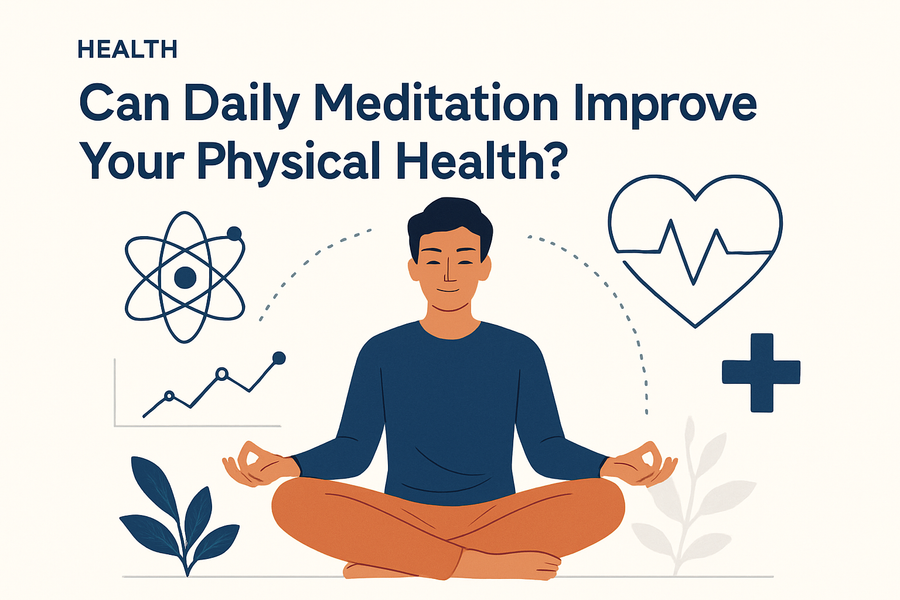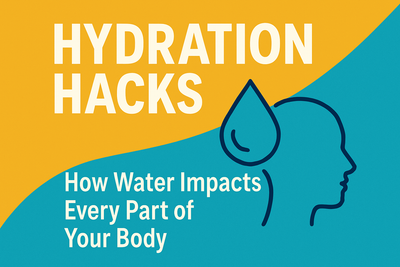Can Daily Meditation Improve Your Physical Health?
Introduction
In our fast-paced, always-connected world, the idea of sitting quietly with our thoughts might seem like a luxury—if not an outright waste of time. But what if daily meditation could do more than just calm your mind? What if it could actually improve your physical health? Science is increasingly pointing toward a strong link between regular meditative practice and a number of tangible physiological benefits. From reduced inflammation and lower blood pressure to enhanced immune response and better sleep quality, meditation may offer a powerful tool for maintaining and even improving your physical well-being.

The Mind-Body Connection
The foundation of meditation's impact on physical health lies in the profound connection between the mind and body. When you're stressed, your body responds accordingly—your heart rate increases, muscles tense, and hormones like cortisol flood your system. Over time, chronic stress can take a serious toll on your physical health, contributing to conditions such as hypertension, cardiovascular disease, and a weakened immune system.
Daily meditation helps interrupt this stress cycle by promoting relaxation and activating the parasympathetic nervous system—the part responsible for 'rest and digest' activities. By calming the mind, meditation reduces physical manifestations of stress and promotes overall body homeostasis.
Stress Reduction and Cortisol Levels
One of the most well-documented physical benefits of meditation is its ability to reduce stress. Numerous studies have shown that mindfulness and other forms of meditation significantly lower cortisol levels, the hormone most closely associated with stress. Elevated cortisol doesn't just make you feel anxious—it also increases blood sugar, suppresses the immune system, and contributes to weight gain.
A daily meditation habit can counteract these effects. Just 10 to 20 minutes of mindful breathing or guided visualization can help the body shift from fight-or-flight mode to a state of rest and recovery, allowing hormones to rebalance and the body to heal.
Improved Cardiovascular Health
Heart disease remains one of the leading causes of death globally. While diet and exercise are crucial components of heart health, meditation offers an additional, often overlooked avenue for cardiovascular care. Research has found that regular meditation can lower blood pressure, reduce heart rate variability, and improve overall circulation.
Transcendental Meditation, for example, has been studied extensively for its role in reducing systolic and diastolic blood pressure. These changes may be attributed to lowered stress levels, improved emotional regulation, and increased awareness of bodily habits that might affect heart health, such as smoking or overeating.
Enhanced Immune Function
Your immune system is your body's defense mechanism against infections and diseases. Studies have indicated that daily meditation can enhance immune function by modulating stress and fostering a more balanced inflammatory response.
One notable study published in “Psychosomatic Medicine” found that individuals who practiced mindfulness meditation for eight weeks displayed higher levels of antibodies in response to a flu vaccine compared to a control group. This suggests that meditation may help the body mount a more effective immune response.
Better Sleep Quality
Sleep is essential for physical recovery and overall health. Unfortunately, many people struggle with falling and staying asleep due to stress, anxiety, or an overactive mind. Meditation can significantly improve sleep by quieting the mental chatter and helping the body transition into a state conducive to rest.
Mindfulness practices before bed can reduce the time it takes to fall asleep and decrease nighttime awakenings. Over time, consistent meditation has been linked to better sleep architecture, including longer periods of deep, restorative sleep.
Pain Management
Chronic pain is another area where meditation has shown promising results. While meditation doesn’t eliminate pain entirely, it changes the way the brain perceives and processes pain signals. Techniques such as Mindfulness-Based Stress Reduction (MBSR) have been used successfully in clinical settings to help patients manage conditions like fibromyalgia, arthritis, and back pain.
By fostering a non-judgmental awareness of physical sensations, meditation teaches individuals to relate to their pain differently, often resulting in decreased perception of severity and increased pain tolerance.
Boosted Metabolism and Weight Management
Interestingly, meditation may also support metabolic health and assist in weight management. Stress is a known contributor to unhealthy eating patterns and metabolic issues. Meditation can help regulate appetite by bringing more awareness to hunger cues and emotional eating triggers.
Some studies suggest that meditative practices influence insulin sensitivity and glucose metabolism, thereby aiding in weight regulation and reducing the risk of Type 2 diabetes. While meditation alone isn't a magic bullet for weight loss, it can be an effective component of a broader lifestyle strategy.
How to Start a Daily Meditation Practice
Starting a meditation practice doesn’t require special equipment or hours of free time. Begin with just 5–10 minutes a day in a quiet space. Focus on your breath, a mantra, or even a guided session using apps like Headspace or Calm. Consistency is more important than duration.
Here are a few tips to make meditation a daily habit:
- Set a specific time: Mornings or evenings work best for many people.
- Create a dedicated space: A quiet corner can make a big difference.
- Use technology: Apps and online videos can guide and motivate you.
- Be patient: Meditation is a skill that takes time to develop.
Conclusion
The benefits of daily meditation extend far beyond mental clarity—they reach deep into the physical realms of our bodies. From lowering stress hormones and blood pressure to enhancing immune response and sleep quality, meditation offers a wealth of health advantages. As more research continues to validate these effects, it's becoming clear that integrating meditation into your daily routine isn’t just good for your mind—it’s one of the best things you can do for your body.
If you're looking for a low-cost, side-effect-free way to support your physical health, why not start with your breath? Just a few minutes a day could lead to lasting wellness gains.







